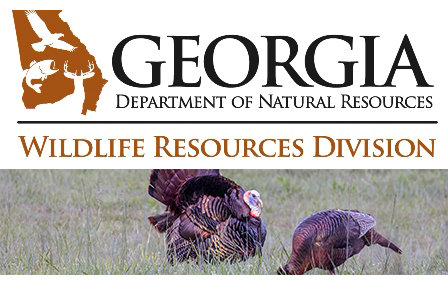
Georgia turkey hunters are practicing their best turkey calls and patterning their shotguns as they get ready for the statewide turkey hunting season opening Saturday, Mar. 20, according to the Georgia Department of Natural Resources’ Wildlife Resources Division.
“Statewide reproduction in 2019 was slightly higher than average, which means we should have a fair number of two-year old birds in the woods,” explains Emily Rushton, Wildlife Resources Division wild turkey project coordinator. “However, I don’t expect harvest to reach the levels it did last year, which was a record harvest for many areas of the state, particularly on public lands.”
What can hunters expect across state regions this spring? Harvest in the Ridge and Valley region of the state should remain high, as reproduction was strong in this area. The Blue Ridge Mountain region also saw continued increases in poults per hen, indicating promise of a good harvest. Unfortunately, the Piedmont region of the state, where many of our hunters focus their efforts, saw a drop in reproduction in 2019, indicating fewer adult birds in the woods. Conversely, reproduction in the Coastal Plain was slightly up, which hopefully is a good sign for hunters in the southern half of the state.
With a bag limit of three gobblers per season, hunters have from Mar. 20 through May 15 to harvest their bird(s).
Georgia Game Check: All turkey hunters must report their harvest using Georgia Game Check. Turkeys can be reported on the Outdoors GA app (georgiawildlife.com/outdoors-ga-app), which now works whether you have cell service or not, at gooutdoorsgeorgia.com, or by calling 1-800-366-2661. App users, if you have not used the app since deer season or before, make sure you have the latest version. More information at georgiawildlife.com/HarvestRecordGeorgiaGameCheck.
Hunters age 16 years or older (including those accompanying youth or others) will need a hunting license and a big game license, unless hunting on their own private land. Get your license at www.gooutdoorsgeorgia.com, at a retail license vendor or by phone at 1-800-366-2661. With many pursuing wild turkeys on private land, hunters are reminded to obtain landowner permission before hunting.
The Georgia Chapter of the National Wild Turkey Federation has donated more than $6,000,000 since 1985 for projects that benefit wild turkey and other wildlife. The NWTF works in partnership with the Wildlife Resources Division and other land management agencies on habitat enhancement, hunter access, wild turkey research and education. The NWTF has a vital initiative called “Save the Habitat, Save the Hunt,” focused on habitat management, hunter access and hunter recruitment.
“Hunters should know that each time they purchase a license or equipment used to turkey hunt, such as shotguns, ammunition and others, that they are part of this greater conservation effort for wildlife in Georgia,” said Rushton. “Through the Wildlife Restoration Program, a portion of the money spent comes back to states and is put back into on-the-ground efforts such as habitat management and species research and management.”
For more hunting information, visit georgiawildlife.com/hunting/hunter-resources.
Turkey Hunting Safety Tips: Review Before Heading to Woods
“The best way to keep yourself, and others, safe while hunting is to always practice firearms safety,” advises Jennifer Pittman, statewide hunter education administrator with the Wildlife Resources Division. “Once you ensure that firearms safety practices are in place, you also want to review and practice precautions that are specific to turkey hunting.”
Turkey Hunting Safety Tips:
- Never wear red, white, blue or black clothing while turkey hunting. Red is the color most hunters look for when distinguishing a gobbler’s head from a hen’s blue-colored head, but at times it may appear white or blue. Male turkey feathers covering most of the body are black in appearance. Camouflage should be used to cover everything, including the hunter’s face, hands and firearm.
- Select a calling position that provides at least a shoulder-width background, such as the base of a tree. Be sure that at least a 180-degree range is visible.
- Do not stalk a gobbling turkey. Due to their keen eyesight and hearing, the chances of getting close are slim to none.
- When using a turkey call, the sound and motion may attract the interest of other hunters. Do not move, wave or make turkey-like sounds to alert another hunter to your presence. Instead, identify yourself in a loud voice.
- Be careful when carrying a harvested turkey from the woods. Do not allow the wings to hang loosely or the head to be displayed in such a way that another hunter may think it is a live bird. If possible, cover the turkey in a blaze orange garment or other material.
- Although not required, it is suggested that hunters wear blaze orange when moving between a vehicle and a hunting site. When moving between hunting sites, hunters should wear blaze orange on their upper bodies to facilitate their identification by other hunters.
Before Going for A Gobbler, Do You Need Hunter Education?
Do you need hunter education before you head to the woods? You have options! Hunters in need of the Georgia hunter education course can choose to go completely online or attend a classroom course, according to the Georgia Department of Natural Resources’ Wildlife Resources Division.
“In 2020, over 17,000 people completed the Georgia hunter education course—either online or in a classroom,” says Jennifer Pittman, statewide hunter education administrator with the Wildlife Resources Division. “Offering both classroom and online options give students the choice about what works best with their schedules, especially those with time constraints.”
The five available online courses each require a fee (from $13.00–$29.95) but all are “pass or don’t pay” courses. Fees for these courses are charged by and collected by the independent course developer. The classroom course is free of charge.
Completion of a hunter education course is required for any person born on or after January 1, 1961, who:
- purchases a season hunting license in Georgia.
- is at least 12 years old and hunts without adult supervision.
- hunts big game (deer, turkey, bear) on a wildlife management area.
The only exceptions include any person who:
- purchases a short-term hunting license, i.e. anything less than annual duration (as opposed to a season license).
- is hunting on his or her own land, or is a dependent hunting on land of his or her parents or legal guardians.


Georgia Lifestyle
DNR: Clean Feeders Save Birds

Crime & Safety
Body Found in Baldwin County Missing Person Investigation

Bulloch Public Safety
04/25/2024 Booking Report for Bulloch County

Bulloch Public Safety
04/09/2024 Booking Report for Bulloch County

Bulloch Public Safety
04/01/2024 Booking Report for Bulloch County

Bulloch Public Safety
04/08/2024 Booking Report for Bulloch County

Bulloch Public Safety
04/22/2024 Booking Report for Bulloch County

Bulloch Public Safety
04/15/2024 Booking Report for Bulloch County





